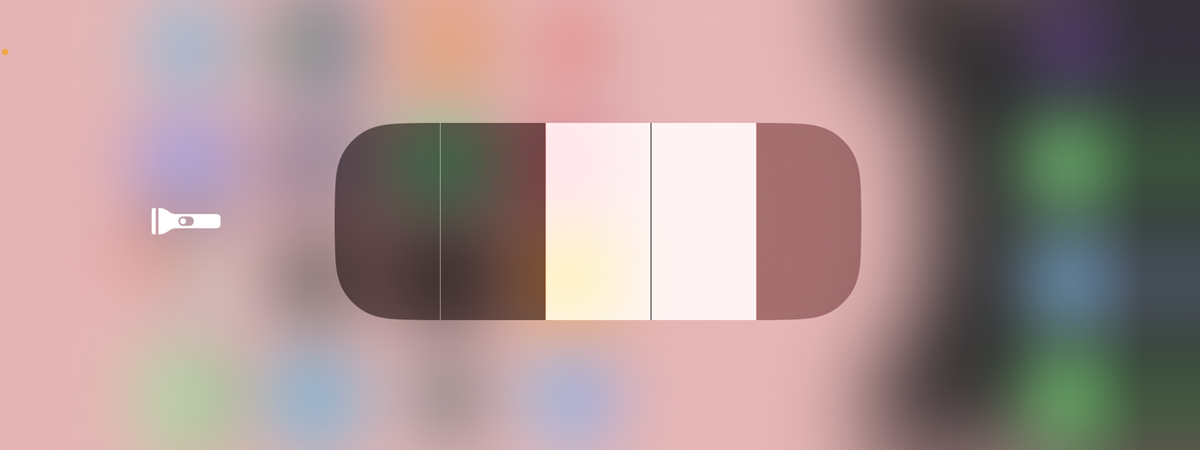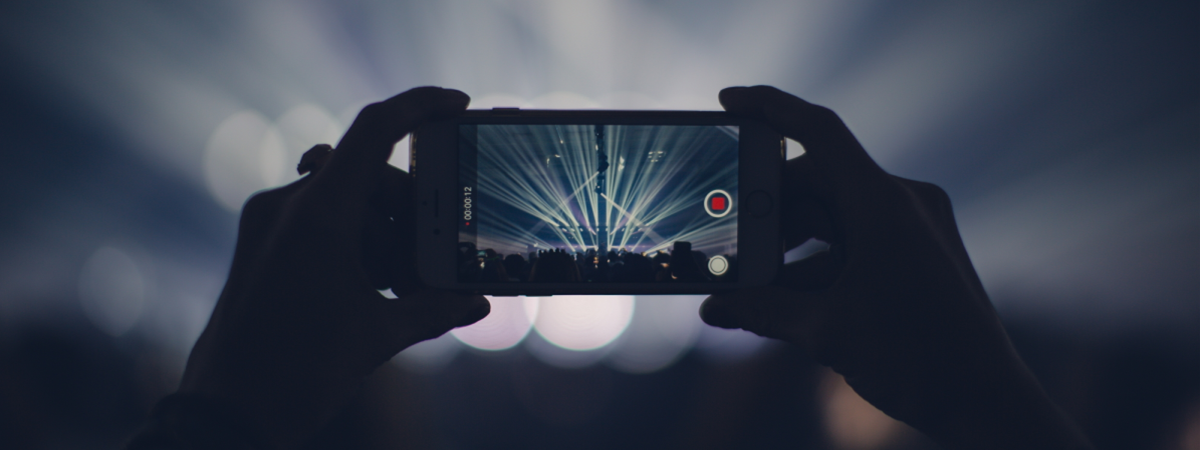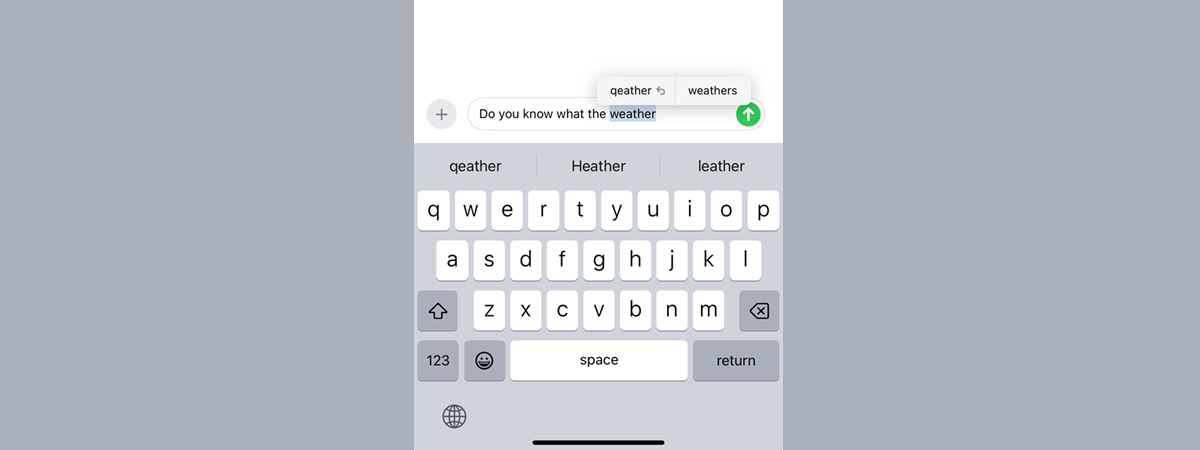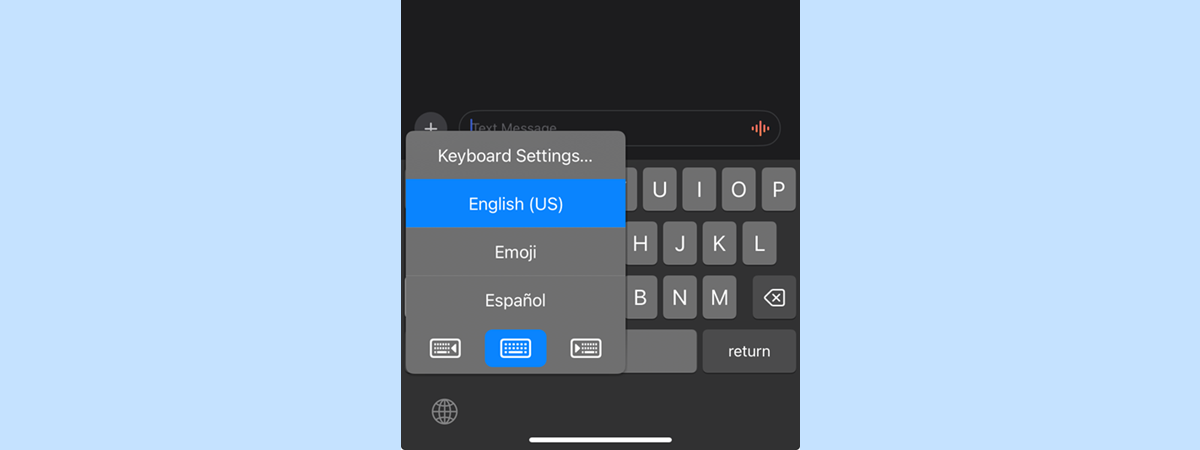
Sometimes, you need to know how to change the keyboard on an iPhone to one you’re comfortable with. Maybe you want a different iPhone keyboard layout, or you’re wondering how to add a language to the keyboard on iPhone to communicate with friends from abroad in their native tongue. No matter what you need, you’re in the right place. This guide illustrates how to add a Spanish keyboard on an iPhone, but the steps are the same no matter which of the 100+ different iPhone keyboards you want to use. I also show how to switch keyboards on an iPhone with ease, regardless of how many of them you’re using. Let’s get started:
How to access the iPhone Keyboard Settings
The fastest way to reach the iPhone Keyboard Settings is by opening any app where you can type, like WhatsApp or the built-in Messages. When your iPhone keyboard pops up, touch and hold the emoji icon in the lower-left corner. In the menu that appears, tap the Keyboard Settings option.
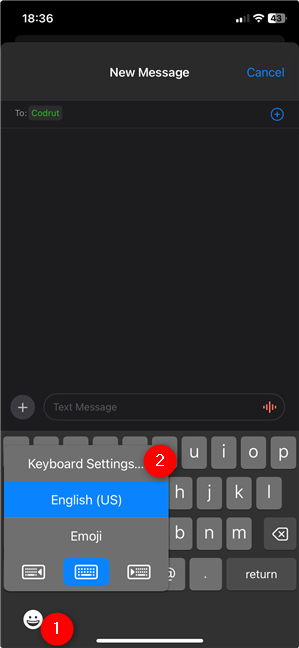
You can access the iPhone Keyboard Settings when the keyboard pops up
NOTE: As soon as you add another language to the keyboard on your iPhone, the smiling emoji is replaced by a world globe icon. The button works the same, and you can learn more about it from this guide’s last chapter.
Alternatively, you can also open the iPhone Settings app by tapping its Home Screen icon.
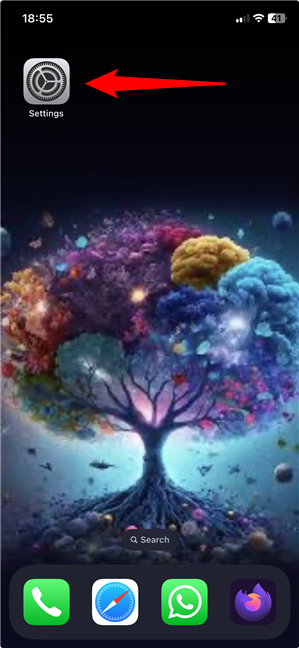
Access the iPhone Settings
Then, tap on General.
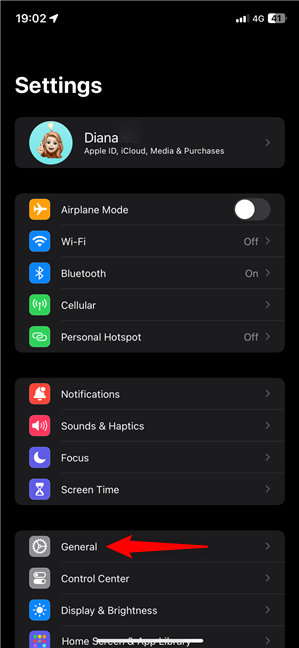
Access General settings
On the General screen, tap the Keyboard entry.
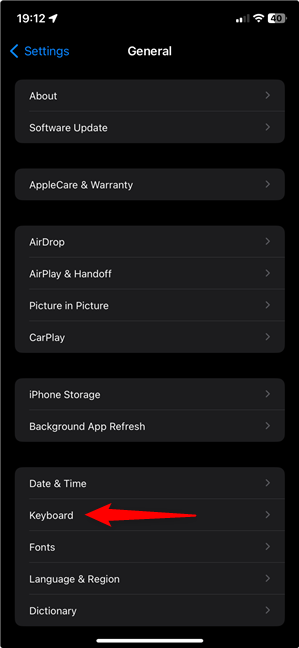
Access the iPhone Keyboard settings
Both methods take you to the Keyboards screen, where you can see all your iPhone keyboard settings.
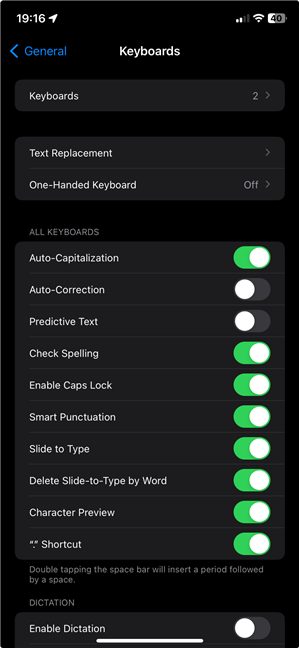
There are two ways to access the iPhone keyboard settings
Moreover, this is the place where you can add a keyboard on your iPhone, so continue reading.
How to add a language to the keyboard on an iPhone
If you want to type in another language, you must first learn how to add a keyboard to your iPhone. The first entry on the Keyboards page is also called Keyboards, and the number next to it indicates the current number of active iPhone keyboards. Tap on Keyboards to continue.
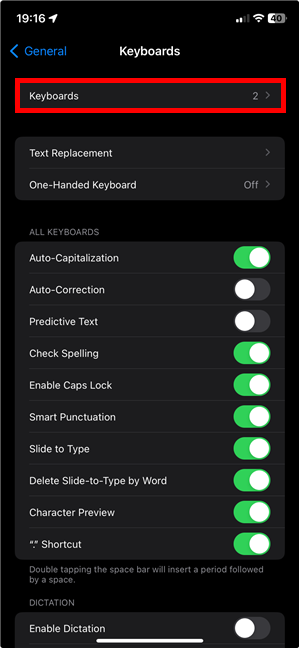
Press to see the active Keyboards for iPhone
You can see the iPhone Emoji keyboard is activated by default, as well as your iOS’ default language - in my case, English (US). All the other active iPhone keyboards are displayed in this list too.
TIP: When you change the interface language of your iOS device, a new iPhone keyboard for that language is automatically added to this list.
To add a keyboard to an iPhone, tap the “Add New Keyboard” button at the end of the list.
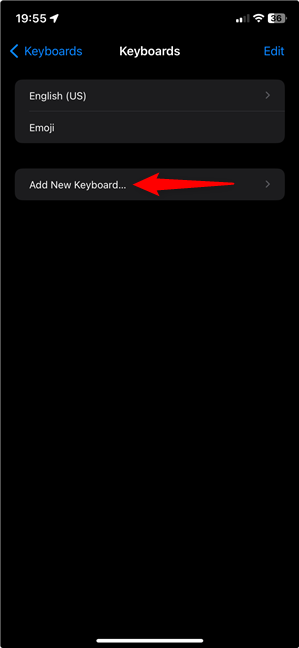
How to add a language to the keyboard on iPhone
The next screen lists all the available keyboards for your iPhone, sorted alphabetically by language and region. Some keyboard languages have more versions - in my case, there is more than one Spanish keyboard for the iPhone. Use the Search option at the top or scroll down through the available iPhone keyboard options. When you find the iOS keyboard you want to use, tap on it.
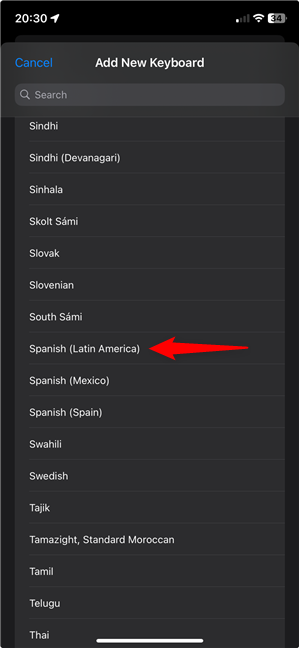
How to add the Spanish keyboard on iPhone
As soon as you add a language to the keyboard on your iPhone, you are returned to the previous Keyboards screen. You can see the new iPhone keyboard language shown in the Keyboards list.
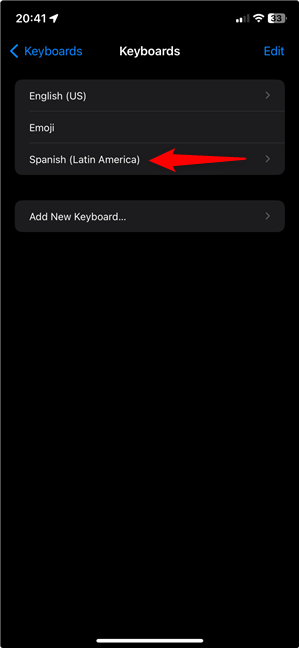
When you add a keyboard to iPhone, it shows up under Keyboards
While these are the steps to add a Spanish keyboard to an iPhone, you can use them to add any keyboard language you want, like Swedish, German, or Hindi.
Before showing you how to change the keyboard on the iPhone as you type, let’s choose an iPhone keyboard layout for your new language.
How to change the iPhone keyboard layout
When you add a keyboard language to your iPhone, a small arrow is shown next to it if there are more layouts available for that language. Tap on a language to choose another iPhone keyboard layout for it.
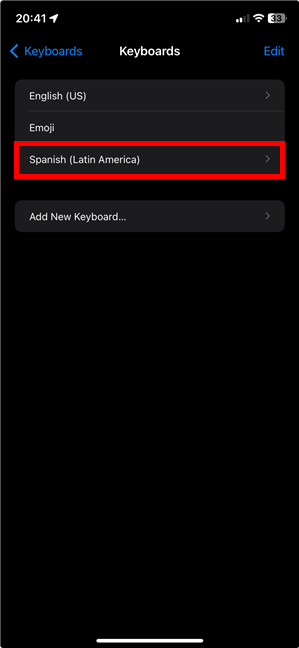
Tap for more layouts for the Spanish keyboard on iPhone
Next, tap the iPhone keyboard layout you want to use. There’s a check mark indicating the option that’s currently selected.
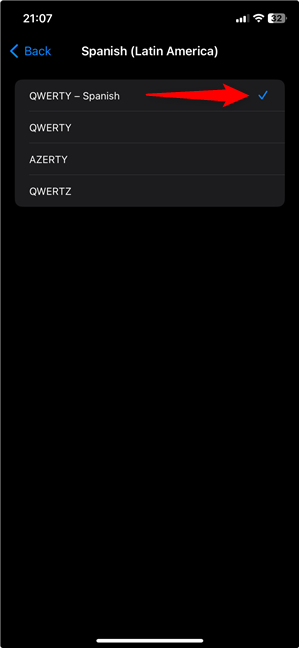
Select an iPhone keyboard layout by tapping it
As you can see, in my case, there are three available layouts other than the default one. Each of them changes the setup of the keys:
- QWERTY - the standard U.S. keyboard layout, where the first row of letters begins with the keys Q-W-E-R-T-Y.
- AZERTY - the standard keyboard for French. The first row begins with A-Z-E-R-T-Y.
- QWERTZ - standard for Germany. The first row begins with Q-W-E-R-T-Z.
If you’re not sure about the one you want, try each option and choose the iPhone keyboard layout you’re comfortable with.
How to switch keyboards on an iPhone
No matter how many keyboards you add to your iPhone, you can easily switch between them. Tap on a text field in any app to bring up the iOS keyboard, and you can notice it looks slightly different than it did in the beginning. The button that lets you access the Emoji keyboard on iPhone is now displayed to the left of the Spacebar, and a Globe icon replaces it, as seen below.
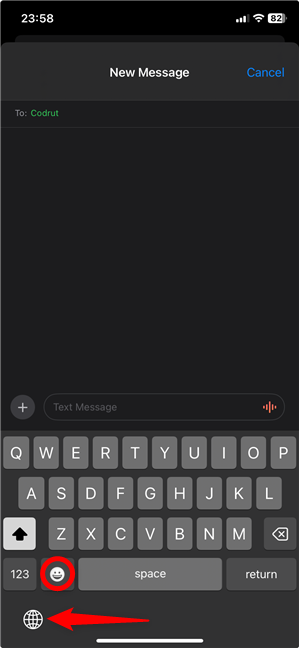
The iPhone keyboard changes when you add another language to it
If you’re wondering how to change your keyboard on an iPhone, there are two alternatives. Tap once on the new Globe icon in the lower-left corner, and the next iOS keyboard in the list becomes active - the Spanish keyboard on my iPhone. If you’re using several languages, keep an eye on the spacebar to ensure you get the right one. When you switch, the new language is briefly displayed, and then you can see the name of the spacebar translated into the active language to avoid confusion - in my case, espacio.
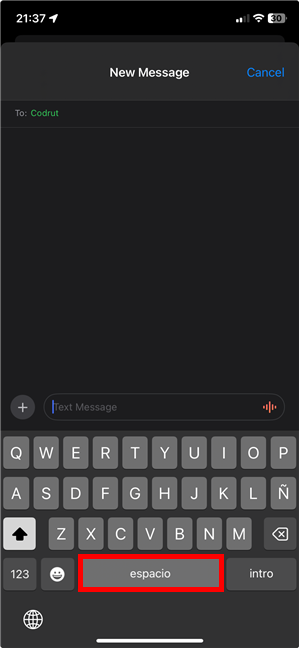
Tap the Globe until you see the keyboard language you want on the spacebar
Unfortunately, the more iPhone keyboard languages you use, the harder it becomes to switch to the one you need using the first method. So Apple added another, more comfortable way to change the iPhone keyboard when you’re using several languages. Touch and hold on the Globe button to open a contextual menu that shows the different active keyboards for your iPhone. Tap the desired language to change the keyboard on your iPhone immediately.
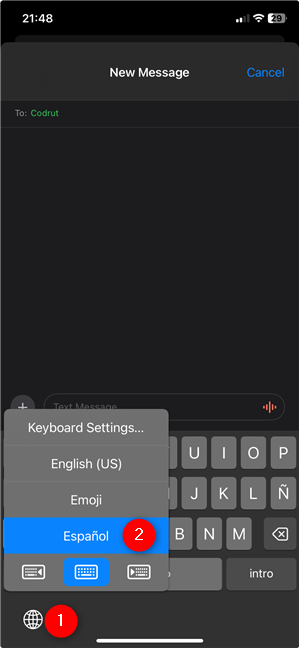
How to change the keyboard on iPhone by touching-and-holding the Globe icon
That is all!
Did you change the keyboard on your iPhone? How many languages are you using?
Now you know how to add a language to the keyboard on your iPhone and how to switch between the available layouts. I find it confusing to use more than two keyboard languages in iOS, so I only added my native tongue to my iPhone, on top of the default English. What about you? Did you change the iPhone keyboard? How many iPhone keyboard languages are you using, and what are they? Leave your answers in the comments section.


 02.04.2024
02.04.2024 